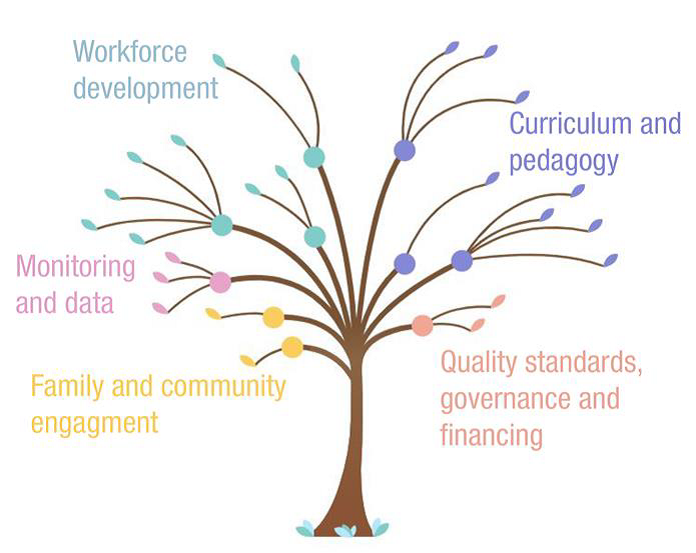In Starting Strong VI, the OECD presented the results of the Quality Beyond Regulations policy questionnaire. One of the most remarkable results of this study is an educational policy tree. It presents the main policy directions in ECEC to support and develop it comprehensively.

The tree and comprehensive approach to ECEC consider five major areas: curriculum and pedagogy; professional development; quality standards, management and financing; monitoring and data; family and community engagement. Although the primary and secondary education policy reaches most of these areas and their components, some aspects are unique and typical just for early childhood education.
The five “branches” represent the most significant tools for creating a quality ECEC system that would contribute to a favorable environment and development of children.
Curriculum and pedagogy are the most important aspects in the effective organization of early childhood education along with professional development. Therefore, they should be included in the basic programme for primary school teachers and the content of training and professional development courses.
One of the objectives in the curriculum development was to maintain a balance and ensure continuity between different age groups taking into account their needs. For this reason, different countries (including Kazakhstan) divide children into the following age categories: 1-3 and 3-6 years old.
The curriculum should incorporate learning objectives for the development of children including fundamental skills (communication and curiosity), values and principles (for example, respect and equality), and traditional subjects (Art and Science). It should also be aimed at the development of cognitive and socio-emotional skills. Moreover, curriculum developers should consider the needs of all stakeholders ranging from educators to parents.
Educators should have autonomy so they could use different learning methods and teaching approaches. Meanwhile, they should follow the guidelines and recommendations.
Professional development. The organization of professional development in ECEC is comparable with other levels of education. Both the training at university and continuous professional development of teaching staff matter. The training courses should be designed to develop a wide range of knowledge and skills and provide educators with an opportunity to move from theory to practice. In addition, the OECD suggests that quality accreditation mechanisms should be introduced to determine teachers’ qualifications to provide quality education.
Professional development of ECEC managers is also required to create proper working conditions and a favorable environment for both employees and children. ECEC managers should effectively perform two functions: administrative and pedagogical and build effective communication with employees, parents and local community.
Quality control, management and financing. One of the strategic financing objectives in ECEC should be to ensure a stable influx of personnel and competitive wage. Financing should be organized within clearly defined standards that take into account the physical needs of children.
Countries should determine the level of autonomy that ECEC managers can have. It will help adjust the early childhood education to the immediate needs of students.
Monitoring and data. ECEC settings should be monitored from three perspectives: quality of education, implementation of the curriculum and personnel training. They should use an integrated approach to monitoring and its frequency depends on the issues and risks affecting the quality of services provided. The monitoring tools include inspection, assessment and peer assessment of educators, surveys, portfolios, and evaluation of students.
Family and community engagement is a more important component in ECEC than at other levels of education. Parents should also be involved in the development of the curriculum that will include effective methods of communication with parents, and approaches to the comprehensive development of children. Moreover, the training courses for ECEC educators and managers should incorporate such components as engagement of the family and community in learning and care.
Sources:
OECD (2021). Starting Strong VI: Supporting Meaningful Interactions in Early Childhood Education and Care, Starting Strong, OECD Publishing, Paris.
